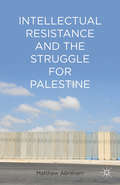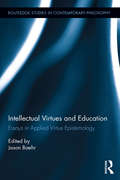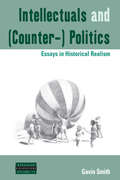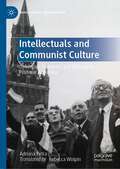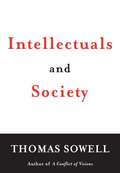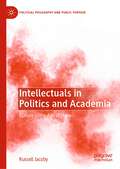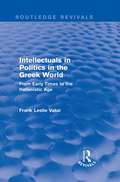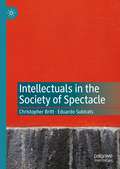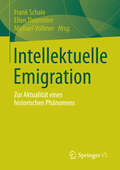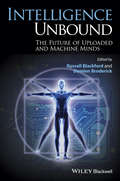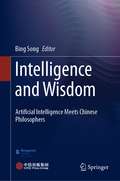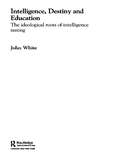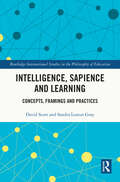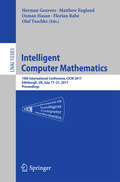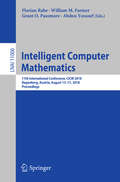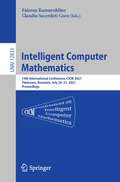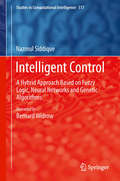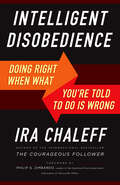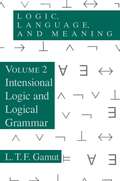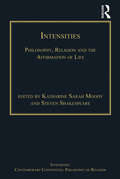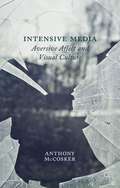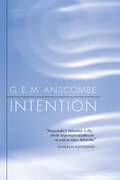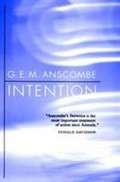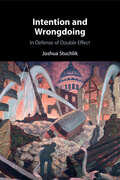- Table View
- List View
Intellectual Resistance and the Struggle for Palestine
by M. AbrahamBy positioning the late Edward Said's political interventions as a public intellectual on behalf of Palestinian populations living under Israeli occupation as a form of intellectual resistance, Abraham moves to consider forms of physical resistance, seeking to better understand the motivations of those who choose to turn their bodies into weapons.
Intellectual Virtues and Education: Essays in Applied Virtue Epistemology (Routledge Studies in Contemporary Philosophy)
by Jason BaehrWith its focus on intellectual virtues and their role in the acquisition and transmission of knowledge and related epistemic goods, virtue epistemology provides a rich set of tools for educational theory and practice. In particular, characteristics under the rubric of "responsibilist" virtue epistemology, like curiosity, open-mindedness, attentiveness, intellectual courage, and intellectual tenacity, can help educators and students define and attain certain worthy but nebulous educational goals like a love of learning, lifelong learning, and critical thinking. This volume is devoted to exploring the intersection between virtue epistemology and education. It assembles leading virtue epistemologists and philosophers of education to address such questions as: Which virtues are most essential to education? How exactly should these virtues be understood? How is the goal of intellectual character growth related to other educational goals, for example, to critical thinking and knowledge-acquisition? What are the "best practices" for achieving this goal? Can growth in intellectual virtues be measured? The chapters are a prime example of "applied epistemology" and promise to be a seminal contribution to an area of research that is rapidly gaining attention within epistemology and beyond.
Intellectuals and (Counter-) Politics: Essays in Historical Realism
by Gavin SmithContemporary forms of capitalism and the state require close analytic attention to reveal the conditions of possibility for effective counter-politics. On the other hand the practice of collective politics needs to be studied through historical ethnography if we are to understand what might make people's actions effective. This book suggests a research agenda designed to maximize the political leverage of ordinary people faced with ever more remote states and technologies that make capitalism increasingly rapacious. Gavin Smith opens and closes this series of interlinked essays by proposing a concise framework for untangling what he calls "the society of capital" and subsequently a potentially controversial way of seeing its contemporary features. This book tackles the political conundrums of our times and asks what roles intellectuals might play therein.
Intellectuals and Communist Culture: Itineraries, Problems, and Debates in Post-war Argentina (Marx, Engels, and Marxisms)
by Adriana PetraThis book investigates a central chapter in the history of 20th century intellectualism: the commitment to the communist ideal and the Soviet Union. Focusing on Argentina, whose communist party was among the most important in Latin America, Petra engages with the current literature on Western communism in order to conduct an exhaustive study of the intellectuals, cultural organizations, publications, and debates within Argentine communism in the decades following World War II. Based on rigorous archival research from diverse sources, Petra’s book distances itself from existing teleological visions and institutional approaches to the communist world, offering instead a complex framework in which multiple contexts, scales, and actors frame the larger problem: the intellectual commitment to a political project that brooked no dissent. Intellectuals and Communist Culture also addresses the emergence of Peronism, a crucial movement in Argentine political life to this very day, thus offering an important chapter on Latin American political and intellectual history and an invaluable contribution to the global history of the international communist movement.
Intellectuals and Society
by Thomas SowellSowell (Hoover Institution, Stanford U. ) issues a right-wing jeremiad against the intelligentsia, the membership of which seems to primarily consist of academics, writers, etc. whose views he finds distasteful. If there is a core argument to the work, it is that intellect does not equal wisdom, that the ideas of intellectuals are not subjected to empirical verifiability, and that intellectuals wield an outsized influence on society that often leads to harmful outcomes (less so, he notes gratefully, in the United States than in Europe, although it is telling that he places the high point of US intellectuals' influence as being in the 1960s and 1970s, an era of greater left influence than later decades). However, this core argument appears to be less of a thesis to be proved than a hook upon which to hang a litany of complaints against ideas that he disagrees with in the realms of economics, social visions, the law, and war. With regards to these complaints, Sowell is frequently less than convincing, as he rarely treats the ideas of his opponents with even a semblance of seriousness. On the very first page, for instance, he argues that Marx's idea that labor is the source of all wealth is disproved because, "if this were true, countries with much labor and little technology or entrepreneurship would be more prosperous than countries with the reverse, when in fact it is blatantly obvious that the direct opposite is the case. " This is such a laughably ridiculous distortion of Marx's theory of labor value that is hard to imagine that any thoughtful reader could possibly take it, or most of the rest of Sowell's similarly-styled arguments, seriously. Those on the right who merely want their political beliefs reinforced may find the work enjoyable however. Annotation ©2011 Book News, Inc. , Portland, OR (booknews. com)
Intellectuals in Politics and Academia: Culture in the Age of Hype (Political Philosophy and Public Purpose)
by Russell JacobyThis book addresses the fate of intellectuals in modern culture and politics. Russell Jacoby’s seminal The Last Intellectuals: American Culture in the Age of Academe (1987, 2000) introduced the term “public intellectual” and gave rise to heated controversy. Here Jacoby assesses contemporary public intellectuals, their profound failings and limited achievements. The book includes biting appraisals of well-known intellectuals, such as Noam Chomsky, Hannah Arendt, and Bernard-Henri Lévy, as well as interventions on violence, utopia and multiculturalism.
Intellectuals in Politics in the Greek World: From Early Times to the Hellenistic Age (Routledge Revivals)
by Frank VataiIntellectuals in Politics in the Greek World, first published in 1984, was the first comprehensive study of this recurrent theme in political sociology with specific reference to antiquity, and led to significant revaluation of the role of intellectuals in everyday political life. The term ‘intellectual’ is carefully defined, and figures as diverse as Pythagoras, Plato and Aristotle; Isocrates, Heracleides of Ponteius and Clearchus of Soli are discussed. The author examines the difference between the success of an intellectual politician, like Solon, and the failure of those such as Plato who attempted to mould society to abstract ideals. It is concluded that, ultimately, most philosophers were conspicuously unsuccessful when they intervened in politics: citizens regarded them as propagandists for their rulers, while rulers treated them as intellectual ornaments. The result was that many thinkers retreated to inter-scholastic disputation where the political objects of discussion increasingly became far removed from contemporary reality.
Intellectuals in the Society of Spectacle
by Christopher Britt Eduardo SubiratsThis book reveals the sense in which our postmodern societies are characterized by the obscene absence of the intellectual. The modern intellectual--who had once been associated with humanism and enlightenment—has in our day been replaced by media stars, talking heads, and technical experts. At issue is the ongoing crisis of democracy, under the aegis of the société du spectacle and its vast networks of politically-induced idiocy, industrially-produced biocide, and militarily-provoked genocide. Spectacle fills the resulting moral and intellectual vacuum with electronic technologies of control, punishment, and destruction. This postmodern tyranny reduces intelligence to mechanistic, positivist, and grammatological models of inquiry, while increasing the segmentation, fragmentation, and dissolution of human existence. The apotheosis of the spectacle explains the intellectual void that lies at the heart of our postmodern decadence; it also accounts for the need to recuperate the humanist values of enlightenment promoted by the modern intellectual tradition.
Intellektuelle Emigration
by Frank Schale Michael Vollmer Ellen ThümmlerEine Intellektuellengeschichte des 20. Jahrhunderts muss die geistigen Einflüsse deutscher Wissenschaftsemigranten zwischen 1933 und 1945 berücksichtigen. Zu einschneidend prägte sie das literarische, kulturelle und politische Denken diesseits und jenseits des Atlantiks. Aus einem breiten Verständnis von Ideengeschichte heraus werden nicht nur prominente Emigranten wie Hannah Arendt, Arnold Bergstraesser und Franz L. Neumann, sondern zugleich dem drohenden Vergessen anheim fallende Flüchtlinge wie Sigmund Neumann, Ferdinand Hermens und Otto Neurath oder bisher kaum beachtete Biographien von André Gorz und Romain Rolland vorgestellt. Einerseits rekonstruieren die Beiträge die dramatischen Lebenslinien sowie die oft unter beklemmenden Bedingungen angefertigten politischen, gesellschafts-, kultur- und wissenschaftstheoretischen Arbeiten. Andererseits wagen sie auch einen Blick auf die Perspektiven der Emigrationsforschung heute.
Intelligence Unbound
by Damien Broderick Russell BlackfordIntelligence Unbound explores the prospects, promises, and potential dangers of machine intelligence and uploaded minds in a collection of state-of-the-art essays from internationally recognized philosophers, AI researchers, science fiction authors, and theorists.Compelling and intellectually sophisticated exploration of the latest thinking on Artificial Intelligence and machine mindsFeatures contributions from an international cast of philosophers, Artificial Intelligence researchers, science fiction authors, and moreOffers current, diverse perspectives on machine intelligence and uploaded minds, emerging topics of tremendous interestIlluminates the nature and ethics of tomorrow's machine minds--and of the convergence of humans and machines--to consider the pros and cons of a variety of intriguing possibilitiesConsiders classic philosophical puzzles as well as the latest topics debated by scholarsCovers a wide range of viewpoints and arguments regarding the prospects of uploading and machine intelligence, including proponents and skeptics, pros and cons
Intelligence and Wisdom: Artificial Intelligence Meets Chinese Philosophers
by Bing SongThis book centers on rethinking foundational values in the era of frontier technologies by tapping into the wisdom of Chinese philosophical traditions. It tries to answer the following questions: How is the essence underpinning humans, nature, and machines changing in this age of frontier technologies? What is the appropriate ethical framework for regulating human–machine relationships? What human values should be embedded in or learnt by AI? Some interesting points emerged from the discussions. For example, the three dominant schools of Chinese thinking–Confucianism, Daoism and Buddhism– invariably reflect non-anthropocentric perspectives and none of them places humanity in a supreme position in the universe. While many Chinese philosophers are not convinced by the prospect of machine intelligence exceeding that of humans, the strong influence of non-anthropocentrism in the Chinese thinking contributed to much less panic in China than in the West about the existential risks of AI. The thinking is that as human beings have always lived with other forms of existence, living with programs or other forms of “beings,” which may become more capable than humans, will not inevitably lead to a dystopia. Second, all three schools emphasize self-restraint, constant introspection, and the pursuit of sage-hood or enlightenment. These views therefore see the potential risks posed by frontier technologies as an opportunity for the humanity to engage in introspection on the lessons learned from our social and political history. It is long overdue that humanity shall rethink its foundational values to take into account a multi-being planetary outlook. This book consists of nine leading Chinese philosophers’ reflections on AI’s impact on human nature and the human society. This is a groundbreaking work, which has pioneered the in-depth intellectual exploration involving traditional Chinese philosophy and frontier technologies and has inspired multidisciplinary and across area studies on AI, philosophy, and ethical implications.
Intelligence, Destiny and Education: The Ideological Roots of Intelligence Testing
by John WhiteThe nature of intelligence and how it can be measured has occupied psychologists, educationalists, biologists and philosophers for hundreds of years. However, there has been little investigation into the rise of the traditional dominant educational ideology that intelligence and IQ have innate limits and are unchanging and unchangeable. This book traces the roots of this mind set back to early puritan communities on both sides of the Atlantic, drawing parallels between puritan dogma and the development of the traditional curricula and selection processes that are still firmly embedded in school practice today. Drawing on the work of Galton, Pearson, Burt, Goddard, Terman and others in his search for the truth about intelligence testing, John White looks at the personal histories and socialised religious backgrounds of these key psychologists and casts an entirely new light on schooling in Britain and the USA in modern times. This work also shows how we can transcend this heritage and base our educational system on values and practices more in tune with the twenty-first century.
Intelligence, Sapience and Learning: Concepts, Framings and Practices (Routledge International Studies in the Philosophy of Education)
by David Scott Sandra Leaton GrayExamining the idea of intelligence in its diverse sociological and philosophical formations, Intelligence, Sapience and Learning explores the multiple and often complex meanings associated with the concept of intelligence, and its relationships with learning, curriculum and sapience. Scott and Leaton Gray explain a series of key concepts central to understanding the meta-concepts and practices of intelligence, learning and curriculum. These concepts include epistemology, free will and volition, hermeneutics, pragmatism, strong normative evaluations and pedagogy, amongst others. Focusing on six praxes that form a genealogy of the concept of intelligence, Scott and Leaton Gray argue for a re-framing of the concept and practice of intelligence, with profound consequences for how modern societies should be organised and how people should live their lives. This book is a follow-up to Women Curriculum Theorists: Power, Knowledge and Subjectivity, and takes a fresh look at the concept and practice of intelligence. It will appeal to curriculum theorists and those with an interest in curriculum and learning matters, as well as those working in the philosophy and sociology of education.
Intelligent Computer Mathematics
by Herman Geuvers Florian Rabe Matthew England Osman Hasan Olaf TeschkeThis book constitutes the joint refereed proceedings of three international events, namely the 18th Symposium on the Integration of Symbolic Computation and Mechanized Reasoning, Calculemus 2011, the 10th International Conference on Mathematical Knowledge Management, MKM 2011, and a new track on Systems and Projects descriptions that span both the Calculemus and MKM topics, all held in Bertinoro, Italy, in July 2011. All 51 submissions passed through a rigorous review process. A total of 15 papers were submitted to Calculemus, of which 9 were accepted. Systems and Projects track 2011 there have been 12 papers selected out of 14 submissions while MKM 2011 received 22 submissions, of which 9 were accepted for presentation and publication. The events focused on the use of AI techniques within symbolic computation and the application of symbolic computation to AI problem solving; the combination of computer algebra systems and automated deduction systems; and mathematical knowledge management, respectively.
Intelligent Computer Mathematics: 11th International Conference, CICM 2018, Hagenberg, Austria, August 13-17, 2018, Proceedings (Lecture Notes in Computer Science #11006)
by Florian Rabe William M. Farmer Grant O. Passmore Abdou YoussefThis book constitutes the refereed proceedings of the 11th International Conference on Intelligent Computer Mathematics, CICM 2018, held in Hagenberg, Austria, in August 2018. The 23 full papers presented were carefully reviewed and selected from a total of 36 submissions. The papers focos on the Calculemus, Digital Mathematics Libraries, and Mathematical Knowledge Management tracks which also correspond to the subject areas of the predecessor meetings. Orthogonally, the Systems and Projects track called for descriptions of digital resources, such as data and systems, and of projects, whether old, current, or new, and survey papers covering any topics of relevance to the CICM community.
Intelligent Computer Mathematics: 14th International Conference, CICM 2021, Timisoara, Romania, July 26–31, 2021, Proceedings (Lecture Notes in Computer Science #12833)
by Fairouz Kamareddine Claudio Sacerdoti CoenThis book constitutes the refereed proceedings of the 14th International Conference on Intelligent Computer Mathematics, CICM 2021, held in Timisoara, Romania, in July 2021*.The 12 full papers, 7 system descriptions, 1 system entry, and 3 abstracts of invited papers presented were carefully reviewed and selected from a total of 38 submissions. The papers focus on advances in formalization, automatic theorem proving and learning, search and classification, teaching and geometric reasoning, and logic and systems, among other topics.* The conference was held virtually due to the COVID-19 pandemic.
Intelligent Computer Mathematics: 16th International Conference, CICM 2023, Cambridge, UK, , September 5–8, 2023 Proceedings (Lecture Notes in Computer Science #14101)
by Manfred Kerber Catherine DuboisThis book constitutes the refereed proceedings of the 16th International Conference on Intelligent Computer Mathematics, CICM 2023, held in Cambridge, UK, in September 2023.The 14 full papers, 2 project/survey papers, 6 short papers, and 1 tool paper presented were carefully reviewed and selected from a total of 37 submissions. The papers focus on advances in formalization, automatic theorem proving and learning, search and classification, teaching and geometric reasoning, and logic and systems, among other topics.
Intelligent Control
by Nazmul SiddiqueIntelligent Control considers non-traditional modelling and control approaches to nonlinear systems. Fuzzy logic, neural networks and evolutionary computing techniques are the main tools used. The book presents a modular switching fuzzy logic controller where a PD-type fuzzy controller is executed first followed by a PI-type fuzzy controller thus improving the performance of the controller compared with a PID-type fuzzy controller. The advantage of the switching-type fuzzy controller is that it uses one rule-base thus minimises the rule-base during execution. A single rule-base is developed by merging the membership functions for change of error of the PD-type controller and sum of error of the PI-type controller. Membership functions are then optimized using evolutionary algorithms. Since the two fuzzy controllers were executed in series, necessary further tuning of the differential and integral scaling factors of the controller is then performed. Neural-network-based tuning for the scaling parameters of the fuzzy controller is then described and finally an evolutionary algorithm is applied to the neurally-tuned-fuzzy controller in which the sigmoidal function shape of the neural network is determined. The important issue of stability is addressed and the text demonstrates empirically that the developed controller was stable within the operating range. The text concludes with ideas for future research to show the reader the potential for further study in this area. Intelligent Control will be of interest to researchers from engineering and computer science backgrounds working in the intelligent and adaptive control.
Intelligent Disobedience: Doing Right When What You're Told to Do Is Wrong
by Ira ChaleffWhen It's Smart to Say NoNearly every week we read about a tragedy or scandal that could have been prevented if individuals had said no to ill-advised or illegitimate orders. In this timely book, Ira Chaleff explores when and how to disobey inappropriate orders, reduce unacceptable risk, and find better ways to achieve legitimate goals.The inspiration for the book, and its title, comes from the concept of intelligent disobedience used in guide dog training. Guide dogs must recognize and resist a command that would put their human and themselves at risk and identify safer options for achieving the goal. This is precisely what Chaleff helps humans do. Using both deeply disturbing and uplifting examples, as well as critical but largely forgotten research, he shows how to create a culture where, rather than "just following orders," people hold themselves accountable to do the right thing, always.
Intensional Logic and Logical Grammar: Intensional Logic And Logical Grammar (Logic, Language, and Meaning)
by L.T.F. GamutAlthough the two volumes of Logic, Language, and Meaning can be used independently of one another, together they provide a comprehensive overview of modern logic as it is used as a tool in the analysis of natural language. Both volumes provide exercises and their solutions.
Intensities: Philosophy, Religion and the Affirmation of Life (Intensities: Contemporary Continental Philosophy of Religion)
by Katharine Sarah MoodyIs the affirmation or intensification of life a value in itself? Can life itself be thought? This book breaks new ground in religious and philosophical thinking on the concept of life. It captures a moment in which such thinking is regaining its force and attraction for scholars, and the relevance of thought to social, cultural, political and religious dilemmas about how and why to live. Bringing together original contributions by highly distinguished authors in the field of Continental philosophy of religion, including John D. Caputo, Pamela Sue Anderson, Philip Goodchild, Alison Martin and Don Cupitt, this book has a distinctiveness based on its refusal to sit easily within either secular philosophical or theological approaches. The concept of life mobilizes a thinking that crosses narrow disciplinary boundaries, whilst retaining philosophical rigour. Three sections explore the various dimensions of the question of life: The Politics of Life'; 'Life and the Limits of Thinking'; and 'Life and Spirituality'. This book will be of interest to a broad range of readers in the humanities, particularly to philosophers, theologians, cultural theorists and all those interested in philosophical or theological debates on the concept of life.
Intensive Media
by Anthony MccoskerThere is something unsettling, but also powerful, in the encounter with individual and collective experiences of human suffering. Intensive Media explores the discomfort and fascination initiated by instances of pain and suffering, their 'aversive affects', as they trouble but also vitalise contemporary media environments.
Intention
by G. E. AnscombeIntention is one of the masterworks of twentieth-century philosophy in English. First published in 1957, it has acquired the status of a modern philosophical classic. The book attempts to show in detail that the natural and widely accepted picture of what we mean by an intention gives rise to insoluble problems and must be abandoned. This is a welcome reprint of a book that continues to grow in importance.
Intention
by G. E. M. AnscombeIntention is one of the masterworks of twentieth-century philosophy in English. First published in 1957, it has acquired the status of a modern philosophical classic. The book attempts to show in detail that the natural and widely accepted picture of what we mean by an intention gives rise to insoluble problems and must be abandoned. This is a welcome reprint of a book that continues to grow in importance.
Intention and Wrongdoing: In Defense of Double Effect
by Joshua StuchlikAccording to the principle of double effect, there is a strict moral constraint against bringing about serious harm to the innocent intentionally, but it is permissible in a wider range of circumstances to act in a way that brings about harm as a foreseen but non-intended side effect. This idea plays an important role in just war theory and international law, and in the twentieth century Elizabeth Anscombe and Philippa Foot invoked it as a way of resisting consequentialism. However, many moral philosophers now regard the principle with hostility or suspicion. Challenging the philosophical orthodoxy, Joshua Stuchlik defends the principle of double effect, situating it within a moral framework of human solidarity and responding to philosophical objections to it. His study uncovers links between ethics, philosophy of action, and moral psychology, and will be of interest to anyone seeking to understand the moral relevance of intention.
